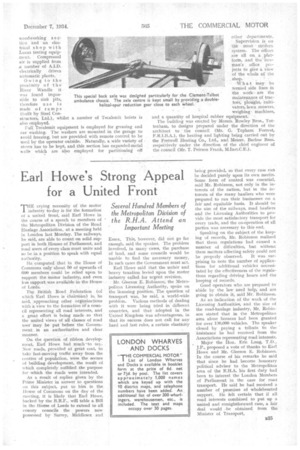Earl Howe's Strong Appeal for a United Front
Page 49

If you've noticed an error in this article please click here to report it so we can fix it.
Several Hundred Members of the Metropolitan Division of the R.H.A. Attend an Important Meeting
THE crying necessity of the motor industry to-day is for the formation of a united front, said Earl Howe in the course of a speech to members of the Metropolitan Division of the Road Haulage Association, at a meeting held in London last Monday. The railways, he said, are able to count on solid support in both Houses of Parliament, and road users of every class must unite and so be in a position to speak with equal authority.
He computed that in the IIouse of Commons only about 50 of upwards of 000 members could be relied upon to support the motor inditstry, and even less support was available in the House of Lords.
The British Road Federation (of which Earl Howe is chairman) is, he said, approaching other organizations with a view to the formation of a council representing all road interests, and a great effort is being made so that the united views of all classes of road user may be put before the Government in an authoritative and clear
manner. ,
On the question of ribbon development, Earl Howe had much 'to say. New roads, provided at great cost, to take fast-moving traffic away from the centresof population, were the scenes of building development, the result of which completely nullified the purpose for (Which the toads were intended.
As a result of replies given by the Prime Minister in answer to questions on this subject, put to him in the llouse of Commons on the day of the meeting, it is likely that Earl Howe, backed by the B.R.F., will table a Bill in the House of Lords to extend to all county councils the powers now possessed by Surrey, Middlesex and Essex. This, however, did not go far enough, said the speaker. The problem involved, in many cases, the purchase of land, and some councils would be unable to find the necessary money. In such cases the Government must act.
Earl Howe said that the unfair and heavy taxation. levied upon the motor industry called for urgent revision.
Mr. Gleesort E. Robinson; the Metropolitan Licensing Authority, spoke on the licensing position. The question of transport was, he said, a world-wide problem. Various methods of dealing with it were being tried in different countries, and that adopted in the United Kingdom Was advantageous, in that its success does not call for any hard and fast rules, a certain elasticity being provided, so that every case can be decided purely upon its own merits. Some form of control was essential, said Mr. Robinson, not only in the interests of the nation, but in the interests of the many hauliers who were prepared to run their businesses on a fair and equitable basis. It should he the aim of the railways, road hauliers and the Licensing Authorities to provide the most satisfactory transport for every trade, and the co-operation of all parties was necessary to this end.
Speaking on the subject of the keeping of records, Mr. Robinson realized that these, regulations had caused a number of difficulties, but without them matters affecting safety could not
be properly observed. It was surprising to note the number of applications for additional vehicles necessitated by the effectiveness of the regulations regarding driving hours and the keeping of records.
Good operators who are prepared to abide by the law need help, and are going to obtain it, said Mr. Robinson.
As an indication of the work of the Licensing Authorities, and the size of the road-haulage industry, Mr. Robinson slated that in the Metropolitan ama alone licences had been granted for over 1;)0,000 vehicles. The speaker closed by paying a tribute to the assistance he had received from the Associations representing road interests.
Major the Hon. Eric Long, T.D., J.P., proposed a vote of thanks to Earl Howe and Mr. Gleeson E. Robinson. In the course of his remarks he said that since he had become honorary political adviser to the Metropolitan area of the R.H.A. his first duty had been to interest the London Members of Parliament in the case for road transport. He said he had received a number of promises of -wholehearted support. He felt certain that if all road interests combined to put up a united and straightforward case, a fair deal would be obtained from the Minister of Transport.




























































































